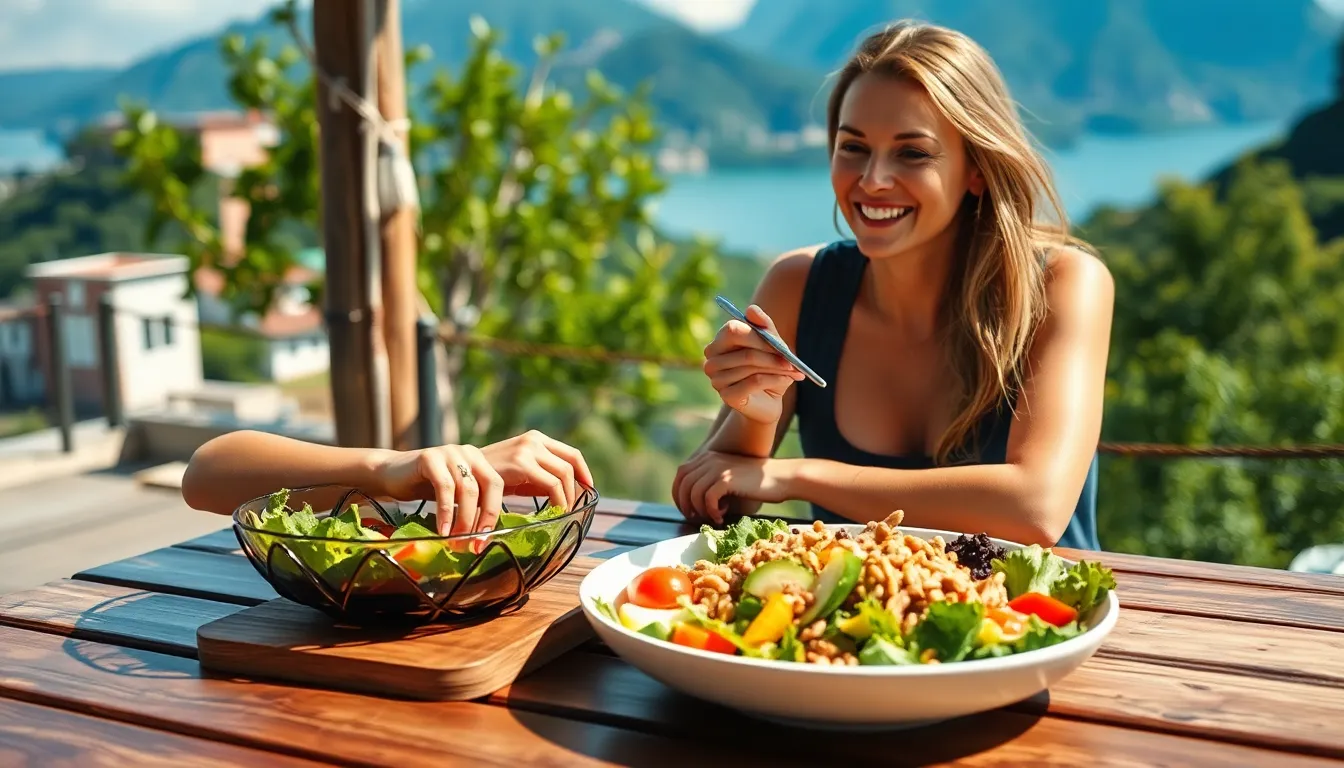Traveling offers a sense of adventure and discovery, but it can also challenge one’s commitment to a healthy lifestyle. Whether it’s a business trip or a leisurely vacation, maintaining good health on the road requires planning and mindfulness. With tempting fast food options and limited access to exercise, many find it easy to slip into unhealthy habits.
However, staying healthy while traveling isn’t impossible. Simple strategies can help travelers make better choices without sacrificing enjoyment. From packing nutritious snacks to finding ways to incorporate physical activity, it’s all about being proactive. With a little effort, anyone can navigate the road while prioritizing their well-being.
Table of Contents
ToggleImportance of Staying Healthy on the Road
Staying healthy on the road significantly impacts overall well-being. Travelers face increased risks of obesity, hypertension, and stress-related issues due to disrupted routines. Prioritizing health while traveling ensures that physical and mental energy levels remain high.
Maintaining a balanced diet on the road helps enhance immunity. Access to nutrient-dense foods reduces susceptibility to illnesses. Packing healthy snacks, such as nuts and fruits, provides convenient options that fuel the body. Eating frequent small meals rather than heavy ones keeps metabolism active and energy consistent.
Incorporating regular exercise offers numerous benefits. Engaging in physical activity energizes the body and combats fatigue. Simple actions, like taking the stairs and walking during breaks, promote movement. Many hotels provide gyms or access to outdoor spaces, offering opportunities for workouts.
Staying hydrated plays a crucial role in maintaining focus. Drinking adequate water counters dehydration caused by travel conditions. Carrying a reusable water bottle simplifies this process, ensuring easy access to hydration throughout the journey.
Mental health remains vital during travels. Stress management techniques, such as mindfulness and yoga, help alleviate anxiety. Taking time for relaxation boosts overall mood and enhances travel experiences. Engaging in social activities or exploring new environments also fosters positive mental states.
Maintaining health on the road establishes a foundation for enjoyable travel experiences. Simple practices enable travelers to thrive physically and mentally while exploring new destinations.
Tips for Maintaining Nutrition

Travelers face various challenges when it comes to maintaining a healthy diet. Proactive planning ensures access to nutritious options throughout the journey.
Choosing Healthy Snacks
Select snacks that offer both nutrition and convenience. Consider the following options:
- Nuts and seeds: Provide healthy fats, protein, and fiber. Almonds, walnuts, and pumpkin seeds boost energy and satiety.
- Fresh fruits: Portable choices like apples, bananas, and oranges deliver vitamins, minerals, and hydration without added sugars.
- Vegetable sticks: Carrots, celery, and bell peppers serve as crunchy, low-calorie snacks rich in nutrients. Pair them with hummus or guacamole for added flavor.
- Whole-grain snacks: Opt for whole-grain granola bars or crackers, which offer complex carbs and fiber for sustained energy.
- Jerky: Look for lower-sodium options, as jerky provides protein while being easy to pack.
Finding Nutritious Meals
Identify meal options that are both nutritious and satisfying. Focus on these strategies:
- Local cuisine: Explore regional dishes that highlight fresh vegetables, lean proteins, and whole grains. Many cultures emphasize healthy meal preparation.
- Restaurants: Seek establishments that prioritize fresh ingredients. Choose grilled or baked options over fried ones, and ask for dressings and sauces on the side.
- Meal prep: If staying in a location with kitchen facilities, prepare simple meals using local produce and lean proteins. Meal prepping enhances control over ingredients.
- Grocery stores: Utilize local grocery stores for ready-to-eat salads, soups, and whole-food items. This option often provides healthier alternatives than fast food.
- Mindful eating: Focus on portion sizes and listen to hunger cues. Eating slowly can help prevent overeating.
Incorporating these strategies fosters better nutrition while traveling, ensuring an overall healthier experience.
Staying Active While Traveling
Staying active on the road enhances physical and mental well-being. Incorporating exercise into daily routines while traveling can be both practical and enjoyable.
Incorporating Exercise into Your Routine
Incorporating exercise into travel plans maintains fitness levels. Prior to departure, travelers might schedule workouts or plan access to fitness facilities. Many hotels offer gyms with equipment suitable for quick workouts. Utilizing online platforms or apps can provide access to guided workouts, including bodyweight routines that require no special equipment. Prioritize short sessions, such as 20-minute high-intensity interval training (HIIT) workouts or yoga practices that can fit into any schedule. Regular movement throughout the day, such as stretching during breaks or participating in quick walks, keeps energy levels up and combats travel fatigue.
Exploring Your Surroundings on Foot
Exploring surroundings on foot offers an excellent opportunity for exercise. Walking tours allow travelers to appreciate local culture while getting physical activity. Choosing to walk instead of taking public transportation or taxis adds to daily step counts. Many cities feature parks or nature trails that encourage walking or jogging. Engaging in activities like hiking or cycling can enhance the traveling experience while promoting fitness. Staying active while discovering new places not only supports a healthy lifestyle but also makes travel more memorable.
Managing Stress and Mental Health
Mental well-being plays a crucial role in staying healthy on the road. Managing stress effectively enhances travel experiences and overall mental health.
Techniques for Relaxation
Practicing relaxation techniques helps alleviate stress and promotes mental clarity. Consider the following methods:
- Deep Breathing: Incorporate deep breathing exercises during travel breaks to decrease anxiety. Focus on inhaling deeply through the nose and exhaling slowly through the mouth.
- Mindfulness Meditation: Utilize apps or guided sessions for mindfulness meditation. Even a few minutes of focused attention can ground travelers and reduce negative thoughts.
- Progressive Muscle Relaxation: Tense and then relax different muscle groups systematically. This technique releases physical tension often accumulated during travel.
- Stretching: Perform simple stretches to relieve muscle tightness from prolonged sitting. Stretching enhances circulation and promotes relaxation.
Staying Connected with Loved Ones
Connection with others aids mental well-being while traveling. Consider these approaches to sustain relationships:
- Regular Check-ins: Schedule daily or weekly check-ins through calls or video chats. Consistent communication eases feelings of isolation.
- Share Experiences: Share travel updates and experiences through social media or messaging apps. This interaction fosters a sense of community and connection.
- Plan Visits: When traveling long distances, consider scheduling visits with friends or family who live nearby. These meet-ups create personal connections, enhancing the travel experience.
Incorporating these strategies into travel routines can substantially improve stress management and mental health.
Conclusion
Traveling doesn’t have to mean sacrificing health and well-being. With thoughtful planning and a proactive mindset, it’s possible to enjoy nutritious meals and stay active on the road. By choosing healthy snacks and exploring local cuisines, travelers can maintain a balanced diet that fuels their adventures. Incorporating exercise into daily routines helps combat fatigue and enhances overall energy levels.
Mindfulness techniques and stress management practices play a crucial role in maintaining mental clarity during travels. Staying connected with loved ones adds an extra layer of support. By prioritizing health and well-being, travelers can create memorable experiences that enrich their journeys without compromising their physical or mental health.



